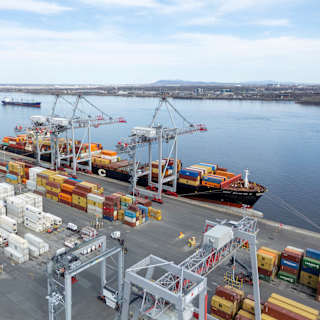- Trade War Takes Its Toll
- Manufacturing Mirrors Wholesale Woes
- Economic Headwinds Mount
Canada's wholesale trade continued its downward slide in May, with an advance estimate showing sales fell 0.4% as the economic fallout from escalating trade tensions with the United States deepened across key sectors.
The decline, driven primarily by lower sales of machinery, equipment and supplies, extends a troubling pattern that has seen Canadian wholesale activity contract sharply this spring amid mounting tariff pressures and supply chain disruptions.

Statistics Canada released the preliminary May figures Thursday, based on a weighted survey response rate of 63.4%12. The data agency will publish official wholesale trade numbers July 14, but the early indicator suggests the sector's struggles are persisting after April's steep 2.3% monthly drop—the sharpest retreat since June 202312.
The wholesale sector, which excludes petroleum and grain sales, serves as a critical link between manufacturers and retailers across Canada's economy. The consecutive monthly declines reflect broader economic stress as businesses grapple with higher costs and shifting demand patterns triggered by the 2025 U.S. trade war with Canada and Mexico3.
The wholesale decline parallels struggles in Canadian manufacturing, where factory sales dropped an estimated 1.3% in May, marking the fourth consecutive monthly retreat12. April's manufacturing decline of 2.8% pushed factory sales to their lowest level since July 202212.
Wholesalers surveyed by Statistics Canada have reported direct impacts from trade tensions, including price increases, changes in product demand, and higher expenses for raw materials, shipping and labor12. These pressures are cascading through supply chains as businesses adapt to new tariff structures and retaliatory measures.
The wholesale sector's troubles underscore broader economic vulnerabilities as Canada navigates heightened trade uncertainty. April's wholesale sales totaled a seasonally adjusted 84.02 billion Canadian dollars, equivalent to $61.2 billion12. Motor vehicle sales led April's decline, though May's preliminary data suggests the weakness has spread to machinery and equipment categories12.
Canada's highly trade-dependent economy faces the prospect of recession within six months if current tariff levels persist, according to economic forecasts3. The disruptions are particularly acute for industries with integrated North American supply chains, where border frictions have increased costs and caused delays4.
Statistics Canada noted that wholesalers—which represent the largest component of Canada's services sector—are adapting to new market realities as they connect domestic producers with institutional buyers and redistribute imported goods12. The sector's performance remains closely tied to broader economic conditions and consumer demand patterns.





